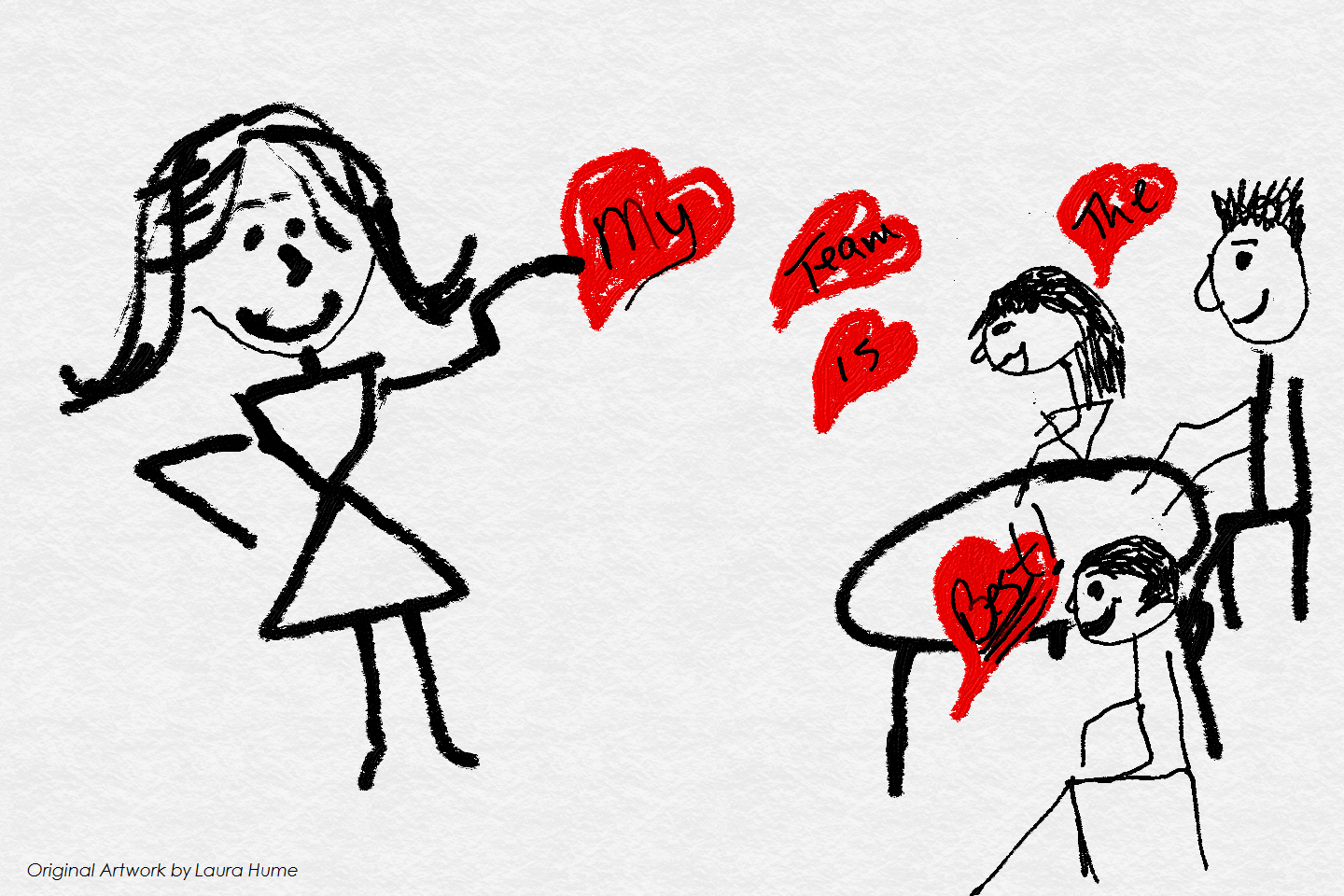
By Emerson Director, Learning and Development, Laura Hume
I love my team. There. I said it. We met three-and-a half-years ago. It was going to be a long distance relationship from the start, as they were scattered across the US. They had recently ended a long-term relationship with my predecessor. Most of them were with her for years and had both personal and professional bonds. I knew I had my work cut out for me, but was confident I had something to offer them if they would give me a chance.
I made sure to use our webcams a lot the first few months. We had individual meetings and group meetings. We texted at odd hours. It was a start. I got to know them as professionals and colleagues. I saw them use their instructional design, program management, and client management skills. I discovered who had specialty areas like eLearning or simulation design. I heaved a sigh of relief. My team was smart, talented, creative…and funny, and talented, and caring. I hadn’t been sold a bill of goods in the hiring process.
I also got to know them as people. I learned about husbands, wives, partners, children, cats, and dogs. I figured out who was introverted and who was extroverted. I discovered who needed lots of support and who wanted only an occasional check-in. They were learning from me and felt supported by me. And, more importantly, I was learning from them and felt equally supported. What started as good will and professionalism turned into strong relationships that I cherish.
However, I occasionally feel like I’m cheating on them.
I feel like I’m cheating because I have a secret…I loved my last team just as much. It was a totally different team with a very different company, but I loved them too. Oh…and I guess I loved the team before that one. And the one before that.
I’ve been reflecting lately on the concepts of love, leadership, and high performance teams. There are several metaphors typical in the leadership literature: Coach, Servant, Conductor, and Guide. I love that a Coach sets a high bar and leverages the strengths of each player. Servant leadership, with its emphasis on social responsibility, speaks to me as well. A Conductor creates a unified whole out of talented individuals, which is very much what I seek to do. A Guide brings others along a sometimes difficult path, and that’s essential in our business.
Yet none of those metaphors felt just right to me. Each implies the leader is acting upon the team in some way. None of them captures the reciprocity and interactivity of team-ness. My love affair with my team is not unrequited. In fact, I’m getting more than I give in this relationship. After all, there are many of them and just one of me. Although my title is Director, I am simply performing the responsibilities of my role — just as each member of my team is – and, together, we create an interactive whole.
Finally, I stumbled upon the African term ubuntu. Leymah Gbowee, who was awarded the Nobel Peace Prize in 2011, is credited with the definition of Ubuntu: “I am what I am because of who we all are.” Muchiri 1 notes that ubuntu focuses on a humanistic concern for relationships employing compassion and respect. Eureka! This was what I was searching for — a word that means we are all together part of the whole.
Brubaker, in his article Servant Leadership, Ubuntu, and Leader Effectiveness in Rwanda2
created a survey for his research study to determine whether Ubuntu leadership was a strong predictor of leader effectiveness. Although he found that it was positively correlated, I am more interested in the (unstudied) correlation of overall team effectiveness.
I adapted Brubaker’s survey and replaced the term “leader” with the term “team,” and I have streamlined the survey to five questions.
- My team provides me with counsel to succeed in my job.
- My team provides me with resources to fulfill my responsibilities.
- My team is sensitive to each other’s problems.
- My team is willing to reach out and help others.
- My team respects each other’s contributions.
My hypothesis is that a team (the named leader plus all members in the reporting chain) that answers “yes” to these five questions is an engaged, high-performing team.
How will your team answer? How will you? If each of you answers yes, I see an HR-approved love affair in your future, too.
Laura Hume is Director of the Learning and Development line of business for Emerson Human Capital Consulting, Inc.
1. Muchiri, M. K. (2011). Leadership in context: A review and research agenda for subSaharan Africa. Journal of Occupational and Organizational Psychology, 84, 440-452.↩
2. Brubaker, T. A. (2013). Servant Leadership, Ubuntu, and Leader Effectiveness in Rwanda. Emerging Leadership Journeys, Vol. 6 Iss. 1, pp. 114 – 147. Regent University School of Business & Leadership ISSN 1941-4684↩



